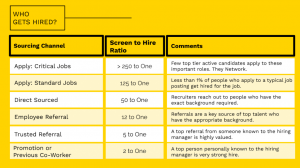Do you have a strong list of connections in your career field? If not, you may be missing out on major career opportunities simply because you aren’t able to get your foot in the door. Landing a job really is about who you know. Networking reigns supreme.
If you’re anything like most professionals, you’ve spent countless hours poring over job postings, looking for the right fit. When you do find a job posting that’s a match for your skills and experience, you probably have mixed feelings about the find.
On one hand, it’s exciting to apply for such a perfect position. On the other, you know your chances of getting a response are somewhere between slim and none because there will be hundreds of other applicants. When you’re up against internal candidates or referrals to the hiring manager, the odds are heavily stacked against you.
Usually there’s nothing wrong with your skills, experience, or resume – you’re not getting a call back because you’re playing the wrong game. Applying online is a numbers game with terrible odds. There will likely be 250+ applicants for a desirable position, and you need a combination of skill and luck to land on the short list for an interview if you’re applying online.
Many times a company will set a cap for the number of applicants to interview, regardless of how many qualified applications they receive. Worse yet, many companies have to post jobs even if they’ve already hired someone for the role.
To turn the tables in your favor, you need to leverage current connections and constantly form new ones. When you have a connection at a given company, the odds of having your resume moved to the top of the pile skyrocket – and that could be all it takes to secure an interview. With the right referral, especially when referred to the hiring manager, you’re a front-runner from the beginning.
The “Who You Know” Numbers
When you consider the hiring data available, a few statistics highlight that when it comes to landing an initial interview, it’s not what you know, it’s who you know.
Research from LinkedIn shows that in 2016, a whopping 70% of people were hired at a company where they already had a connection in place. That should be all the motivation you need to learn how to leverage your network to get referred by someone. At the most desirable companies the number is higher, with 95% landing jobs because of connections.
A study completed by Lever ATS indicated that, once interviewed, a referred candidate has a 20x higher chance of getting hired than someone who applied online for a critical job (8.3% if referred and 0.4% if applied online). When you’re referred by a source trusted by the hiring manager, that number increases to 50x (20% of hire compared to 0.4%).

Breakdown by the numbers of who is getting hired. It all comes down to this: it’s who you know that gets you referred and interviewed as a top candidate.
Where Are You Now?
It’s worth taking stock of your current network to assess your opportunity to get referred. Too often, people focus on their 1st degree connections and fail to realize the true size of their network. It’s not just about who you know- it’s about who your connections know.
I’ve whittled down my LinkedIn connections to about 1800. When you consider all the great companies out there, 1800 isn’t that many people. But when I factor in my connections’ connections (2nd degree connections on LinkedIn) that number grows to 500,000. My connections will happily introduce me to their connections if they like me, know the connection, and are confident in my skills.
Beyond your 1st and 2nd degree connections, alumni from your alma mater are much more likely to talk to you than the average person and the same goes for people from similar affinity groups, hobbies, and communities.
How many influential people do you know? And how large is your network? Your network is key to landing the job.
How to Get Referred for your Dream Job
We know that referrals are priority #1, so let’s talk about the “who” and “how” so you can be one of the newly hired people at your dream company.
Talking to your 1st degree LinkedIn connections is the first step. Find those connections who wholeheartedly believe in your professional abilities and like you. It helps if they’re connected to people in your desired industry, but that’s not vital. I call them your “Top Connectors.” You can be direct with these people. Tell them what you’re looking for, the type of person you want to talk to, and ask who they know.
Ultimately, you want to talk to connections that are company VIPs because they’re who you want to refer you for a specific job. If you’ve done the legwork, a Top Connector will introduce you and you’re on your way. But sometimes you need to get crafty. Try working backwards by using LinkedIn advanced searches to find the ideal people to contact. Find your best mutual connection to introduce you and have them cite a specific reason you’d like to speak with them.
So you have the connections, now what? Informational interviews are your go-to mechanism for getting referred. Just to be clear, informational interviews are NOT explicitly about a job. They’re a learning tool comprised of three main parts:
-Intro/ Connection Building
-Learning and Liking
-How They Can Help
Intro/ Connection Building:
Talk positively and enthusiastically about your mutual connection and shared interests. Emphasize the purpose of the call, the topic you most want to discuss with them (see Learning and Liking). Also be ready to share your quick response to “tell me about yourself.” If you’re terrified of this, consider getting some interview coaching.
Learning and Liking:
Ask thoughtful questions about the connection’s industry, company, and position. You want to ask questions that imply your fit in the industry and company. Surface-level questions could make your connection feel like you’re wasting their time.
Answering difficult questions is an ego boost for the person on the other end of the phone and is crucial to relationship building. When you do this, the connect feels like they’re being helpful to you. Prepare three topics to discuss, knowing you might only cover one.
How They Can Help:
As you near the end of your conversation, the discussion usually transitions to your career. Sometimes they’ll ask how they can help you in your job search. Other times you’ll have to navigate to that topic yourself.
A useful prompt is “the X department sounds like a great fit for me, and I’d love to apply for a position. What do you look for when filling a position in that area?”
Follow up: “If you were in my shoes, what would you do next?”
An effective closing question will elicit a positive response that, at a minimum, will sound something like: “I’d be happy to pass your resume along and put you in the system.” Company referral procedures and policies differ, but being “in the system” usually yields a screening call with a recruiter, bypassing the resume screening process altogether.
Why does this method work? People want to hire people they know (or feel like they know) and data suggests that referred candidates stay longer and are higher quality employees compared to other sourcing channels. They trust someone they know to get the job done, and prefer to work with a friend than a stranger. This “I feel like I know you” emotion doesn’t come from a resume.
Getting Help
So far, all of this sounds pretty good, right? You figure out your ideal next career move, you identify who can help you, and you start requesting introductions & informational interviews. But what happens when you hit a roadblock?
You might be holding down a full-time job at the moment in addition to all the other obligations in your life, so you need to be smart with your time. Too frequently, other priorities get in the way of taking action on proven strategies. That’s where a career coach comes in. A coach can help you focus on the right activities, push past obstacles without hesitation, and navigate complex hiring situations because they’re pros. If you want to learn more about how we can help you, sign up for a consultation today!







